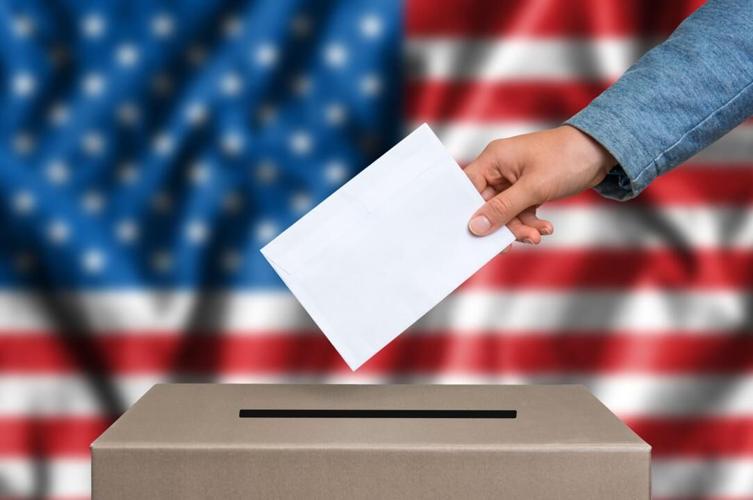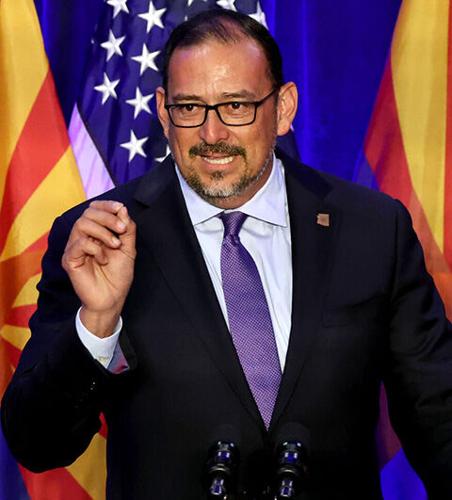PHOENIX — Two top Republican lawmakers have a message for Democratic Secretary of State Adrian Fontes: Change your proposed rules for how elections are run, or we’ll see you in court.
Senate President Warren Petersen and House Speaker Steve Montenegro contend that some of what Fontes plans to put in a new Elections Procedures Manual goes beyond what is in state law. They say that means he is trying to create law on his own, something he cannot do.
The questioned provisions range from changes to the voter registration process to whether party representatives can challenge early ballots over questions of whether the voter has provided proof of citizenship.
“If the secretary of state wants rules changed, he should propose legislation like everyone else,’’ said Petersen in prepared comments.
“Arizona law is clear: The Legislature writes the rules for elections,’’ said Montenegro. “The secretary of state does not get to invent new ones. If Fontes refuses to correct these unlawful provisions, the courts will.”
People are also reading…
Aaron Thacker, spokesman for Fontes, called the threats of litigation “premature,’’ saying the process for adopting a new manual is still underway. He declined to address any of the allegations raised by the GOP lawmakers.

Fontes
“Let’s allow that process to unfold before jumping to conclusions or engaging in political theater,’’ Thacker told Capitol Media Services. “Once the ink is dry, we’ll be better positioned to have a substantive conversation.’’
This isn’t the first time the secretary’s actions have been questioned, and judges previously declared some of what he has done to be illegal.
State laws provide specifics of how everything from voter registration to elections are to be conducted.
But the law also requires the Secretary of State, on a biennial basis, to craft a manual that gets into more specific details as guidance for election officials.
Some provisions spell out logistical issues, such as posting the notice at polling places of write-in candidates and those who have withdrawn from the race. But it also spells out, in greater details than in statute, procedures and rules for polling places.
The Elections Procedures Manual has the force of law, and violators are subject to criminal prosecution.
But what’s in the manual cannot directly conflict with or overrule what’s in the Election Code.
Petersen and Montenegro contend that’s what’s happening here.
For example, they cite a provision in the draft manual that says when a database check provides affirmative evidence someone is not a citizen, election officials should give that person until 7 p.m. on Election Day to “cure’’ the defect.
The Republicans contend that applies only when mandated information is “incomplete or illegible.’’ But they say that once an election official has actual indication the person is not a citizen, the application has to be rejected, a letter sent to the applicant, and the case referred to state and local prosecutors.
Also being questioned is a provision that if an applicant does not furnish “documentary proof of citizenship’’ — required under a 2004 voter-approved law — that the county recorder must attempt to acquire that proof on the applicant’s behalf using other records, such as from the Motor Vehicle Division.
And they challenge another provision that says a “mistake or inconsistency’’ in the required registration of someone to circulate initiative petitions for pay can be excused. The GOP lawmakers say that runs contrary to state law and Supreme Court rulings which require that all laws dealing with initiative petitions be “strictly construed.’’
Thacker said the comments by Petersen and Montenegro will be considered, along with any others submitted by last Saturday’s deadline for feedback, with the possibility there can be changes before the manual has to be submitted to Gov. Katie Hobbs and Attorney General Kris Mayes. Hobbs and Mayes, in turn, can also ask for changes.
“This entire process is designed to be deliberative and transparent, and is scheduled to conclude by the statutory deadline of Dec. 31,’’ Fontes’ spokesman said.
There was more time for comment this year after the state Court of Appeals ruled earlier this year that Fontes had broken the law last time by allowing just 15 days for public comment. The judges said Arizona law requires at least 30 days for comments on any proposed regulations, elections or otherwise.
In another court loss for Fontes, a federal judge last year blocked him from enforcing a provision in his 2023 version of the manual that would have allowed him to refuse to include a county’s vote in the statewide totals if the local supervisors failed to certify the results.
U.S. District Court Judge Michael Liburdi acknowledged the 2022 effort by the Cochise County Board of Supervisors to delay certification. That action threatened to hold up the formal canvass of all the votes through the entire state, and even to change the outcome of some races.
But Liburdi said the solution Fontes incorporated in the Elections Procedures Manual — allowing him to skip over those uncertified votes simply to finalize the state results — would unfairly and illegally disenfranchise voters who had cast ballots.
Liburdi also barred Fontes from enforcing another provision which would have prohibited “any activity by a person with the intent or effect of threatening, harassing, intimidating, or coercing voters ... inside or outside the 75-foot limit at a voting location.’’
The judge said there’s no problem in general with barring intentional threats, intimidation or coercion. The issue, he said, is that it also would outlaw actions that have the effect of doing so, regardless of the intent of the person.
Fontes has asked the 9th Circuit Court of Appeals to review Liburdi’s decision. It has yet to rule on the issue.

Howard Fischer is a veteran journalist who has been reporting since 1970 and covering state politics and the Legislature since 1982. Follow him on X, and Threads at @azcapmedia or email azcapmedia@gmail.com.











